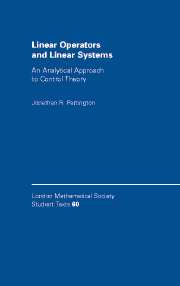4 - Stability and stabilization
Published online by Cambridge University Press: 07 May 2010
Summary
The theme of this chapter is control theory. We discuss what it means to say that a linear system is stable, and then present some of the themes of H∞ control theory, presented from an operator-theoretic point of view.
One of the main aims of modern control theory is to achieve robustness, that is, the stabilization of a system subject to perturbations, measurement errors, and the like. In order to study this we require a measure of the distance between systems, and it turns out that the operator gap is the “correct” one to use. Another way of measuring distances, the so-called chordal metric between meromorphic functions, turns out to be closely related.
Stability theory
The basic signal spaces in this chapter are vector-valued L2(0, ∞) or ℓ2(ℤ+) spaces, and we are concerned with shift-invariant input–output operators T. Our first result shows that, if the domain of such an operator is the whole space, then it is necessarily bounded (a result in automatic continuity theory).
Theorem 4.1.1Let T: L2(0, ∞; ℂm) → L2(0, ∞; ℂp) be an operator commuting with the right shift Rλfor some λ > 0. Then T is bounded.
Proof: It is sufficient to prove the result for m = p = 1, since in general T may be represented by a p × m matrix of shift-invariant operators from L2(0, ∞) to itself.
Information
- Type
- Chapter
- Information
- Linear Operators and Linear SystemsAn Analytical Approach to Control Theory, pp. 63 - 88Publisher: Cambridge University PressPrint publication year: 2004
